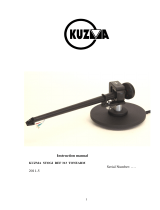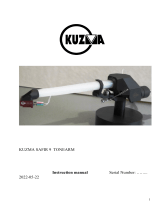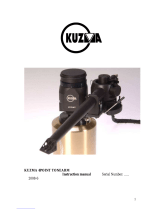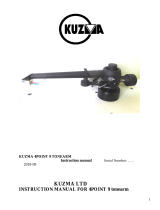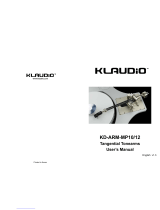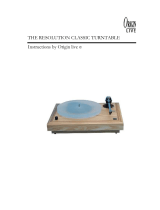Page is loading ...

1
KUZMA STOGI S TONEARM ( with turntable and cartridge) S/N……..
Instruction manual
2010-9

2
KUZMA LTD
INSTRUCTION MANUAL FOR STOGI S tonearm
The Stogi S tonearm is a very precisely engineered piece of equipment. The construction,
however, is robust and requires the minimum of maintenance for optimal performance.
CONTENTS: Page
General 3
Unpacking 4
Basic Setup 5-7
Cartridge set up 8-9
Mainentance 10
Problems 10
Azimuth screw
Arm pillar

3
General Description: the tonearm is packed in one box with serial number and type of
wiring marked on the outside
The tonearm is of a unipivot design with a unique, rigid headshell made from a solid
aluminium block and a base of solid brass which, together, control all vibration as well as
facilitating the stability of the tonearm as a whole. All other parts are machined from
blocks of solid metal in order to provide damping and minimise resonances. The polished
pivot point is sited in a well of oil, which allows only minute friction and bearing vibration.
The height is at record level for optimum tracking, while silicone damping controls resonance
of the cartridge and arm combination and also gives stability in azimuth direction.
Two counterweights allow for easy adjustment of the tracking force and for general and fine
azimuth adjustment. Wires are in one uninterrupted piece from the headshell to the RCA
plugs. When the tonearm is supplied for use on the Stabi S turntable, it is fixed directly into
a brass pillar, which allows VTA adjustment. For mounting on other turntables, armbases
are available as an optional extra.
Stogi S tonearm: Technical data
Mass: 600 gr
Effective distance: 229 mm
Effective mass: 11 g
VTA adjustment: yes ( with armbase)
Azimuth adjustment: yes
Bias adjustment: yes
Arm mount: 25 mm( or into armbase)
Optional: balanced wiring, armbase, fingerlift

4
Unpacking:
The tonearm with accessories is packed in one box. Before unpacking the individual parts of
the tonearm, make some space and check that your turntable has the right tonearm cutout.
Content:
Bearing base,tube base, PVC bottle with silicone oil, Allen keys: 1.5, 2, and 3 mm, cartridge
mounting hex screws M2.5 mm non magnetic, geometry protractor.
Optional:
Armbase for other turntables with accessories ( 3x hex screw and nuts, Allen key 1.5, 3mm),
mounting protractor, fingerlift for headshell.
Stogi S packaging : armtube with cable, bearing base. Fig. 1

5
Basic setup:
Note: When mounting the tonearm on Stabi S turntable no armbase is required. Check the
turntable instruction manual to see how to mount the tonearm and then skip to 'Bearing base'
section of these instructions.
Note: When mounting Stogi S on other turntables, an armbase with an appropriate cutout
is required. There should be adequate space for the counterweight and counterweight rod
when the tonearm is in the 'rest' and inner groove positions. Clearance between the lower
edge of platter and the armboard should be 28-30 mm minimum.
Note: To mount the cartridge, tweezers and a tracking force guage will be needed
Note: Silicone oil should be poured into the bearing base after cartridge adjustments.
Note: Remove parts from protective plastic bags.
Armbase:
Locate the black armbase and the three hex screws. Position the armbase over the cutout on
the turntable armboard and fix screws to nuts using Allen key (3 mm). Ensure that the
screws are long enough to go through the armboard into nuts. Also that the screw for height
and VTA adjustment is accessible with an Allen key (1.5 mm), ie. away from the platter.
Bearing base:
Lift the base from the box. Insert the bearing base into the armbase and position so that the
chromium plated cylinder for the cueing device is facing the front of the turntable. Gently fix
the height with Allen key so that the top of the bearing shaft is on a level with the top of the
platter.
If mounting on a Stabi S turntable, first locate and remove the brass pillar of the turntable by
releasing the VTA locking screw ( Allen key 3 mm). Insert the bearing base into the brass
pillar on the side which does not have threaded holes. The gap between the top of the pillar
and the bottom part of the oil reservoir on the bearing base should be between 5 - 10 mm.
Observe the two screws and fix the bearing base into the pillar with Allen key (3 mm).
Position the brass pillar into the T base of the turntable so that the tonearm bearing shaft is
near to the platter spindle. At the same time both screws should be symetrical but further
away. See fig 2.
Now observe the position of the cueing device cylinder and ensure that this is facing the front
of the turntable. This will be the position of the tonearm when in the 'rest' position. If this
position is not suitable, release both screws and rotate bearing base in the brass pillar. Repeat
this process until you find a position where the tube is parallel to the right hand side of the
lid. This seems complicated in theory but is not in practice.

6
The bearing base with cable holder in its brass pillar on Stabi S. Fig. 2
Tube base:
Carefully lift the tube base with counterweights and cable which, (for transport only) is
fixed at the end of the tube. Position it gently onto the bearing shaft. The bearing pivot will
automatically fit into the bearing cup on top of the bearing shaft. With Allen key (1.5 mm),
release and then remove the metal holder and cable from the back of the tube and carefully
fix it on the outside of the bearing base. Rotate the cable in such a way that the wires rise
vertically. Then fix it with Allen key 1.5 mm. With fingers gently arrange the wires into a
loop. ( See arrow on Fig.2 and Fig. 3)
Due to the counterweight being at the end of the tonearm, the headshell end is raised. Using
the same Allen key ( 1.5 mm), release the top screws and slide both weights off. Now you
can check the position of the tube in the 'rest' position and rearrange the bearing base if
necessary. Return first the thicker and then thinner counterweight to the rod and fix them
gently so that the fixing screws are on top.
If Stogi S is mounted on other turntables, move the tube by hand towards the spindle as if
in an 'inner groove' position and ensure there is enough clearance for the rod and
counterweights. If not, consult your dealer.
See cable fixing. Fig. 3.
Bearing cup Oil level-groove
Cable holder
Turntable Stabi S fixing
screws
Stabi S VTA adjustment screw

7
Cartridge mounting:
Locate the hex screws for fixing the cartridge, or use screws supplied with the cartridge. Fix
the cartridge under the headshell in such a position that the tip of the diamond is at the
furthest point of the headshell.
With tweezers or other appropriate tool, (if using pliers be aware that strong force can break
the wires under the insulation material) connect pins according colours:
Red right +
Green right -
White left +
Blue left -
Tracking force:
Adjust the thicker counterweight so that the cartridge is balanced while keeping the thinner
counterweight as far away from the bearing as possible. If the cartridge is tilted (azimuth)
when viewed from the front, rotate the thicker counterweight. For some lighter cartridges
one counterweight will be adequate to obtain the correct tracking force.
To adjust tracking force use a guage and move the counterweight closer to the bearing to
obtain the chosen force. Consult your dealer.
Cartridge set up:
Place the cartridge on the record and observe azimuth and height of the tonearm (VTA).
Height (VTA):
Adjust the height of the tonearm by raising or lowering the bearing base so that the arm tube
is parallel to the record.
Stabi S: Release the VTA screw which holds the brass pillar, while holding the bearing
base. Then reposition it and lock it back.
Armbase: Release the VTA screw in the armbase while holding the bearing base and
reposition it and lock it back.
Azimuth:
Level the turntable horizontally. Any change will affect the azimuth. Observe the mirror
image of the cartridge on the record and adjust the tilt of the cartridge so that the mirror
image and the cartridge will be vertical and straight. For this adjustment, rotate the thinner
counterweight. If you find that the tilt is excessive, then first rotate the thicker
counterweight and then make fine adjustments with the thinner counterweight. See Page 2.
Tangential geometry:
Adjust the geometry of the cartridge in the headshell so that zero point will be on the
protractor in both null points (66, 120.9 mm). Consult your dealer .
Oil for damping:
Carefully lift the tube base, bearing in mind the length of the wires and put it on top of the
platter. Cut the tip off the nozzle of the PVC bottle and squeeze to fill the reservoir
surrounding the bearing shaft till the fluid level reaches the groove line inside the reservoir.

8
In addition put 1-2 drops of fluid into the cup on top of the bearing shaft. The level of
damping is chosen to suit the best cartridges available but you should experiment, especially
with cheaper MM cartridges.
Bias adjustment:
Catch the string loop onto the hook which is at the back of the tube base. Be sure that the
string runs in the groove. Adjustments are made by moving the small counterweight after
releasing it with the Allen key (1.5mm). The maximum position is for 2.5 g tracking force
and the minimum is for 1 g. Finer adjustment should be done using a test record. Consult
your dealer.
Fine adjustments:
Re-check and readjust the tracking force, VTA and azimuth if necessary. For more precise
adjustments, play the cartridge for 5- 10 hours and then readjust. The cartridge will need
about 50 hours playing to settle down for the best sound.
Fine VTA:
The correct height of the tonearm is different for different cartridges and tracking forces. It
could be above or below the theoretical 'parallel tube' position for up to 4-5 mm. If you are
above the optimum height the sound becomes bright and thin and if below, the sound could
be bass heavy and not open. Feel free to experiment or consult your dealer.
Fine Azimuth:
The starting position is in a line with its mirror image. For fine adjustment a test record and
oscilloscope are needed. In the thicker counterweight, however, there is a small screw on the
right, which can be rotated using Allen key (3 mm). Rotation of the screw will slightly
change the azimuth. Counterclockwise rotation tilts the cartridge to the left and vice versa.
Counting rotations enables you to listen to improvements in focus and to return to the original
position. If necessary consult your dealer.
Cueing device:
The height of the cueing device can be adjusted with Allen key (1.5 mm).
Tube rest:
The height of the tube rest can be adjusted with Allen key (1.5 mm).

9
Mainentance:
Bearing:
The bearing does not require any maintenance.
Cueing device:
Occasionally clean the black foam tube support to increase grip, using soft cloth soaked in
alcohol.
Problems:
Silicone oil spill :
If oil is spilled, firmly wipe with cloth or paper towel. Afterwards clean with a soft cloth
soaked in alcohol.
Tube runing outwards:
Due to the silicone damping and descent rate of the tonearm, lower friction on the cueing
device in the 'play' position may cause the tube to travel towards the outer edge of the record.
Check that surfaces on the cueing device are clean and, with fingers, bend down the part of
the cueing device which lifts the tube at the inner groove. Check that bias is not too strong.
Also check that the wire loop is in a normal arc .
Mistracking:
Inadequate tracking force.
The cartridge may be too light. If so check the choice of counterweight and use only one
instead of two, or consult your dealer.
Cueing device too high in 'play' position and is touching the tube. See the air gap and lower
the cueing device.
Transportation:
When moved, be sure to secure the tube against the armrest and be sure that you do not tilt
the turntable for more than 15 degrees, as this could cause a leakage of silicone oil.
If moving longer distances, refix the cable to the back of the tube, lift up the tube base and
keep it above the bearing base for a short period of time until the silicone oil has dropped
back into the reservoir. Clean the brass damping base with a paper towel. If you cannot be
sure that the bearing base will be shipped level, remove silicone oil by pouring it away and
wipe surfaces with a paper tower. If necessary obtain a new bottle of silicone oil from your
dealer.
Kuzma Ltd
Hotemaze 17A
SI-4205 PREDDVOR
SLOVENIJA
P: +386 4 25 35 450
F: +386 4 25 35 454
E mail:[email protected]
www.kuzma.si
/

